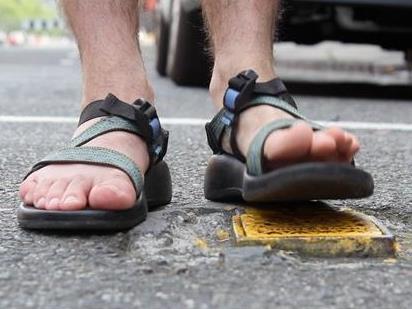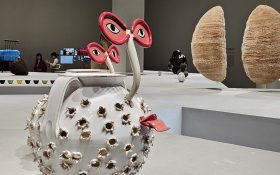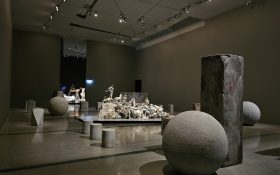Charlie Sofo, Cracks, faults & fractures, 2012 (video still), digital video, 1:30 mins. Courtesy the artist and Darren Knight Gallery, Sydney. Sofo is one of the five artists who have announced they will boycott the Biennale.
Five artists are boycotting the Sydney Biennale because they object to sponsorship by Transfield Holdings, a shareholding in Transfield Services which runs offshore asylum seeker detention centres. The head of Creative Partnerships Australia, the key marriage-broker for arts-business partnerships, defends the arrangement.
The issues raised by artists participating in the Biennale of Sydney in relation to Transfield’s sponsorship of the Biennale are complex.
At the heart of the matter is the fact that some Biennale artists disagree ethically with one of Transfield’s revenue streams; offshore detention centres.
However, while respectful of the choice of individual artists to participate in the Biennale or not, to argue that this longstanding and critical partnership should be severed on this basis alone overlooks the intricate and multi-faceted benefits that such well-working arts/business partnerships bring, and which cannot simply be substituted by a new partnership, even if one can be found.
These include the networks, leadership and influence that such partnerships generate for arts organisations, including the ability to secure other partners and sponsors, in addition to the financial support offered. As anyone working in the arts knows, finding and developing such partnerships takes time and talented staff to manage these relationships, in order that they benefit and grow based on the needs of both organisations.
In that it has achieved the hallmarks of a highly successful arts/business partnership – mutually developed networks, community development, sponsorship growth, the creation of an internationally significant festival, and partner engagement on a strategic as well as a financial basis – this partnership marks one of the most successful arts/business partnerships in Australia. In fact, the partnership was awarded by the Australia Business Arts Foundation for its longevity and success in 2002.
It is as a direct result of the unwavering support of the Belgiorno-Nettis family over the last 41 years since its inception that the Biennale has become one of the leading international exhibitions of contemporary art in the world, and has contributed to Australia’s reputation as a leading creative nation. In practical terms, the immense contribution of the Biennale to the international arts would not be possible without this key partnership.
Ultimately, the Biennale has a responsibility to each of its stakeholders to continue, which it has publicly stated it can only do with the support of Transfield. In addition to more than 90 participating artists, who would lose not only an important source of income, but the myriad of opportunities that being part of such a prestigious international exhibition presents, other stakeholders include: other partners and donors; the government, which invests in the Biennale at a local, state and national level; and the local, interstate and international community, which made 665,488 visits to the last Biennale.
Incidentally, such large visitor numbers are in part spurred by the fact that the Biennale’s three-month-long program is offered free of charge to the public, made possible with the support of partners. This too is worth acknowledging, given the role that accessibility to the arts plays in creating long term cultural, social and economic impact for our communities throughout Australia, connecting people from diverse backgrounds and cultures, and in turn strengthening and contributing to our nation’s collective creativity and culture.
At a time when private sector support for the arts is more important than ever, major, long-standing partnerships such as this serve as a model for other arts organisations towards securing a sustainable future.
It is estimated that in 2009-10 (the most recent figures available) private donations and corporate sponsorship almost doubled within the decade to contribute $221 million to Australia’s arts and cultural sectors, comprising $123 million in philanthropic income, and $98 million in corporate sponsorship.
This message has been strongly reinforced by the government as it becomes clear that the arts cannot look to ever-growing government subsidies. Recently Minister for the Arts, Senator George Brandis, stated that one of his key priorities is to grow funding and other support for the arts from the private sector, and arts/business partnerships will play an important role in this.
While the government invests around $700 million in the arts and cultural sectors each year, private sector support provides an essential supplement to this, accounting for approximately 10 per cent of all arts funding. Indeed the role of Creative Partnerships Australia in growing this support is imperative, including through our slate of funding, development and mentoring programs, as supported by the Australian government.
Given the growing importance of arts/business partnerships, I cannot stress enough that partnerships such as that between the Biennale of Sydney and Transfield are critical to the overall ecology and sustainability of our arts sector.
So, are the protesting artists wrong to boycott the Biennale?
The artists who wrote to the Biennale board said that exercising ethical awareness and transparency regarding funding sources is critical to arts partnerships, and it is important that this exercise is undertaken by both the arts organisation and the business seeking to form a partnership.
In this case, no breach of transparency has occurred. A business has been appointed to deliver on a bi-partisan government policy and in accordance with Australian law. Therefore, any objection to Transfield’s involvement is down to the individual artist’s beliefs. While respecting that a small number of artists (five to date) have decided to act with ‘ethical awareness’ by withdrawing from the Biennale, the views of these artists will not necessarily reflect those of all artists involved, while the call by a few to boycott the Biennale outright will impact all artists involved.
In the spirit of a well-working partnership, the Board of the Biennale of Sydney, Transfield and the protesting artists have been respectful, honest and empathetic to each other’s situation and stance.
However, the Biennale of Sydney has publically stated that, ‘without our founding partner, the Biennale will no longer exist‘.
While respecting the right and the choice of a number of artists to withdraw on their own ethical grounds, the arts sector should not allow these objections to derail one of our nation’s most important arts/business partnerships, and the internationally significant festival it delivers and secures for artists and the community alike.
Note: since this article was published four more artists have joined the boycott.





